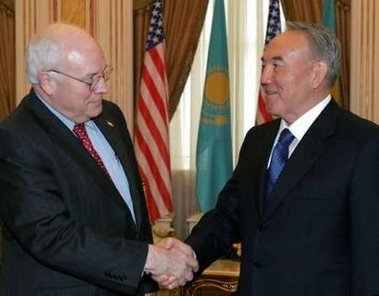Ralph Peters and the "Arab mindset".
 As Iraq continues to fracture and break the supporters of the war are finding it very hard to work out who to blame.
As Iraq continues to fracture and break the supporters of the war are finding it very hard to work out who to blame.
Ralph Peters of the New York Post originally attacked, "leftists desperate for Iraq to fail tried to block the vote by claiming that the population wasn't ready."
Personally, I was never desperate for Iraq to fail, but I did think that a democracy could not be successfully installed until the local population was prepared to vote for the candidate who would best ensure their standard of living rather than simply voting for a candidate based on their ethnicity or their religious beliefs.
This was always, to me, the fatal flaw in Bush's grand plan. It completely ignored history and the messy way that democracy was installed in Britain, France and even in the US itself. The idea that you could deliver it in a box like a piece of self assembly IKEA furniture was always a supreme delusion.
Mr Peters has now caught on to that fact:
Iraq doesn't have a democracy in any meaningful sense. It isn't even a nation. Iraqis didn't vote for freedom. They voted for revenge against each other.The question is who will Ralph choose to blame for this? Having already poured a good deal of approbation towards "leftists" who had the temerity to successfully predict this outcome, Ralph then rounds on the real culprits for this mess. It is, of course, the Arab mindset itself!
They elected ward bosses, not national leaders. We could have skipped the balloting and apportioned legislative seats by population shares.
Their social, political, economic and cultural structures leave them catastrophically uncompetitive with the developed world. Societies divided down the middle by religion, inhibited by tribal loyalties and conditioned to accept corruption can't build healthy democracies.And then he seems to describe the US under George Bush when he states, without a shred of irony:
Above all, societies and cultures that refuse to accept responsibility for their own failures can't build democracies.Perhaps Ralph and the others who cheered on this disaster would do better to reflect upon those last words themselves. He goes on:
As difficult as it can be to discern in the hype-and-gripe Internet age, our own system works because we shoulder the burden of our errors, seek to understand what went wrong - and fix the problem.If the latter were true Ralph would realise that he, and others who think like him, are the problem. However, he insists on shovelling the blame towards Arabs in general:
It would be racist to claim that Arabs are genetically inferior. It is simply the truth to admit that Arab societies are volatile disasters.There! See how he did that? He admits that certain notions are racist, then thinks he's avoiding being racist by simply restating the same sentiment in a different way.
We can expect more of this nonsense in the coming months. It's becoming obvious, even to stalwarts like Ralph, that the US mission in Iraq is a disaster:
We've done what we could in Iraq, and we've done it nobly. We should not withdraw our troops precipitously, but the clock is ticking. It's now up to the Iraqis to succeed - or become yet another pathetic Arab failure. If Iraqis are unwilling to grasp the opportunity our soldiers and Marines bought them with American blood, it's their tragedy, not ours.
We did the right thing by deposing Saddam Hussein. The Arab Middle East needed one last chance. Iraq is it. If Iraqi democracy fails, there will be no hope, whatsoever, for the Arab world.
When the whole misadventure fails, it will not - according to Ralph and his ilk - be the fault of Bush and the neo-con philosophy, it will be the fault of the "Arab mindset". And that's not racist according to Ralph, because he's talking about Arab states rather than Arab individuals. A subtle distinction that I readily admit is lost on me.
What is very clear in all of this is that Ralph and his pro-war supporters intend to take no responsibility for the havoc they have wreaked on that region.
This is no doubt a perfect example of the way we, "shoulder the burden of our errors, seek to understand what went wrong - and fix the problem."
In Ralph's eyes, it's what makes us superior. Ho hum...





































